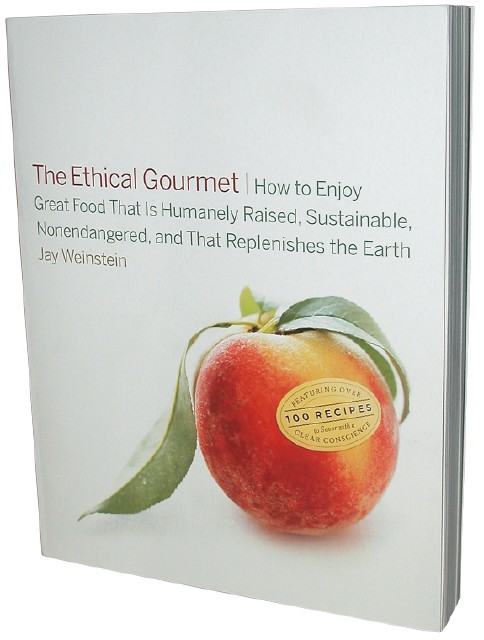I like cheap food. I like food that is riddled with preservatives, easy on the pocketbook and, more often than not, microwavable. Nasty, salty, overly sweetened in convenient boxes with just a hint of frost on the outside; that’s what you’ll find in my fridge on a bad week. Sometimes I get the healthy urge and go for the low-fat frozen meals or tell the guy at Subway to go easy on the mayo.Hanging in the back of my mind has always been the vague notion that this food is not only hard on my body, but hard on the world as well. I know the food the average American consumes is not grown, gathered or paid for in a socially responsible way, the same way I understand that meaty, gummy chicken nuggets start out as things with feathers, eyes, feet and digestive systems of their own. But ethical food is expensive and hard to find , I complain. I haven’t had a clue about where to begin–until now. A tiny Jay Weinstein has sauntered up to my lips and knocked vigorously on my two front teeth. He’s here with his book The Ethical Gourmet , a look at how to eat responsibly in a fast-food, Wal-Mart landscape riddled with pitfalls. He’s here to tell us to put our dollars where our mouths are, to vote for smart environmental policy, health standards and the better treatment of workers worldwide with our food choices. Reading The Ethical Gourmet is a commitment in itself. Part guide, part news source, part political commentary and, of course, part cookbook, it’s cleanly written, but of its 353 pages, there are only 100 recipes. “The Politics of Food” segment is an analysis of the how governmental policy is closely linked to the quality and price of food in America, with a look at McDonald’s, Fair Trade Coffee, bottled water, sugar and how much water is used to farm and ranch. (For instance, 50 times as much water goes into producing a kilo of beef than to grow the same amount of soy or rice.)Weinstein isn’t fool enough to tell American readers to give up meat altogether, though. He just suggests that meat should not be the focal point of every meal. That’s in step with what many health experts recommend: meat as a sideshow, not a main act. In line with this thinking, Weinstein includes a variety of legume- and bean-focused dishes.If you’re a slacker in the kitchen like me, complicated cooking instructions try your patience. Many of these recipes seemed straightforward enough. The “Mini Lentil-Scallion Pancakes with Cumin Cream” require making a batter and then frying it in olive oil. The “Chickpea Dip” is food processor material. The “Coconut Rice” calls for simmering for 20 minutes. Weinstein handily includes websites where organic ingredients can be found with most recipes. What’s the matter? Chickpeas and lentils don’t do it for you the way, say, steak does? Weinstein’s got you covered with a handful of gourmet meat dishes (to the tune of beef, pork, poultry, game and seafood–even lamb). Selection is what makes the ethical difference here. Watch out for synthetic or unwieldy amounts of hormones, which you can avoid by buying organic. Ever wondered what the deal is with “natural” meat? The natural stamp means a product doesn’t have artificial ingredients or added color, but it does not mean hormones and antibiotics haven’t been part of raising your food. Now, being somewhat of a gourmet cookbook, Weinstein lists ingredients a Hot Pocket eater such as myself has never heard of. Champagne vinegar? Isn’t that a band? It’s not everyday food, unless you’re of the rare breed that consumes sturgeon caviar regularly. Outside of the informative and relevant commentary on how our food industry works and how I might do my part to chow down on meals in good conscience, I might not cook anything out of this book beyond the occasional bean dip. The most valuable portion, by far, is in the back. The “Sources” entry includes lists of websites and stores broken down by food for easy, quick access to ethical grocers and products. The Ethical Gourmet is aimed at folks with a broad palate and considerable chef skills. I have visions of a book that would reach a much bigger audience, The Ethical Nongourmet: World-conscious Food for Impatient Folks with Little Time and Money Who Can’t Cook Very Well. That book would be coated with flour and egg and living a secure life on my kitchen counter.
Tasteful Reads
Tasteful Reads
Tasteful Reads
The Ethical Gourmet (Broadway Books, softcover, $18.95)

